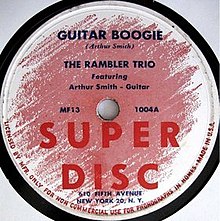Guitar Boogie
| "Guitar Boogie" | |
|---|---|
 |
|
| Single by the Rambler Trio featuring Arthur Smith | |
| B-side | "Beaty Steel Blues" |
| Released | Prior to January 5, 1946 |
| Format | 10-inch 78 rpm record |
| Recorded | Prior to September 15, 1945 |
| Genre | Hillbilly boogie |
| Length | 3:22 |
| Label | Super Disc (no. 1004A) |
| Songwriter(s) | Arthur Smith |
"Guitar Boogie" is a guitar instrumental recorded by Arthur "Guitar Boogie" Smith in 1945. It was one of the first recordings in the style later dubbed "hillbilly boogie" to reach a widespread audience, and eventually sold nearly three million copies. It was the first guitar instrumental to climb the country music charts, and then crossover and also gain high rankings on the popular music charts. "Guitar Boogie" has been interpreted and recorded by a variety of musicians. It is among the songs discussed as the first rock and roll record.
"Guitar Boogie" is an uptempo twelve-bar boogie-style instrumental and is patterned after older boogie-woogie piano pieces. Smith performs the piano parts on guitar, alternating between boogie rhythmic patterns and soloing. Originally a jazz musician, Smith explained, "I guess I picked that [boogie-woogie] from Tommy Dorsey's 'Boogie Woogie', 'cause I didn't listen to country or blues, I listened to big band in those days".
Smith first recorded "Guitar Boogie" in 1945 with the Rambler Trio, with Don Reno on rhythm guitar and Roy Lear on bass. There has been conflicting information on the type of guitar Smith used for the recording; several sources identify it as an acoustic guitar and others as an electric guitar. The piece was released under the name "the Rambler Trio featuring Arthur Smith" by the independent Super Disc Records label. Regionally "Guitar Boogie" did well, due in part to Smith's appearances on popular radio programs, such as Charlotte, North Carolina WBT's Carolina Hayride.
In October 1948, MGM Records (which had purchased Super Disc and Smith's contract) re-released the instrumental under the name "Arthur (Guitar Boogie) Smith and His Cracker-Jacks". By 1949, "Guitar Boogie" reached number eight during a stay of seven weeks on the Hot Country Songs chart and number 25 on the Billboard Hot 100 chart, making it "the first guitar instrumental to climb the Country charts [then] crossover, and climb the Pop Charts". As an early popular example of hillbilly boogie, it is a link between 1940s Western swing and honky-tonk and 1950s rockabilly.
...
Wikipedia
